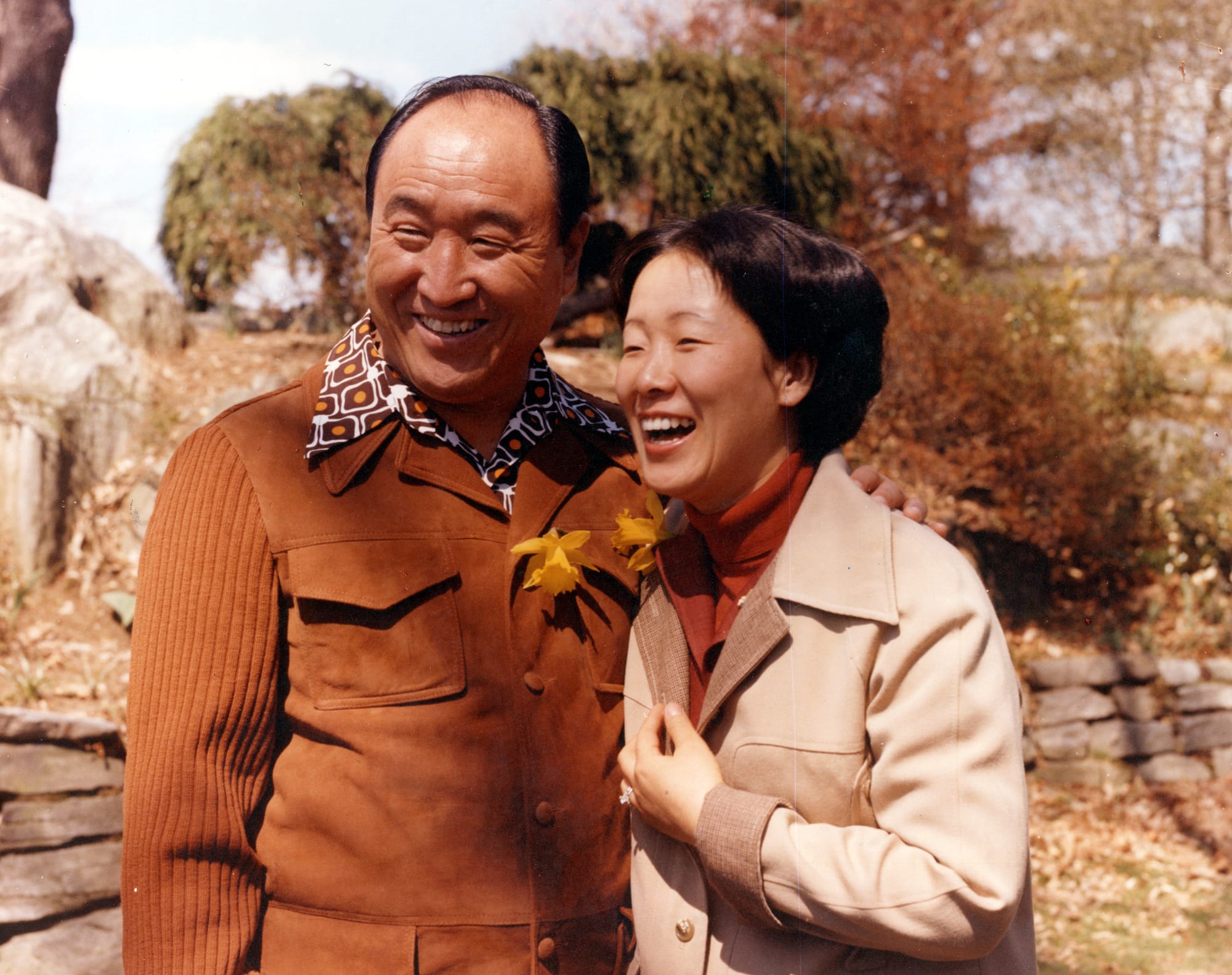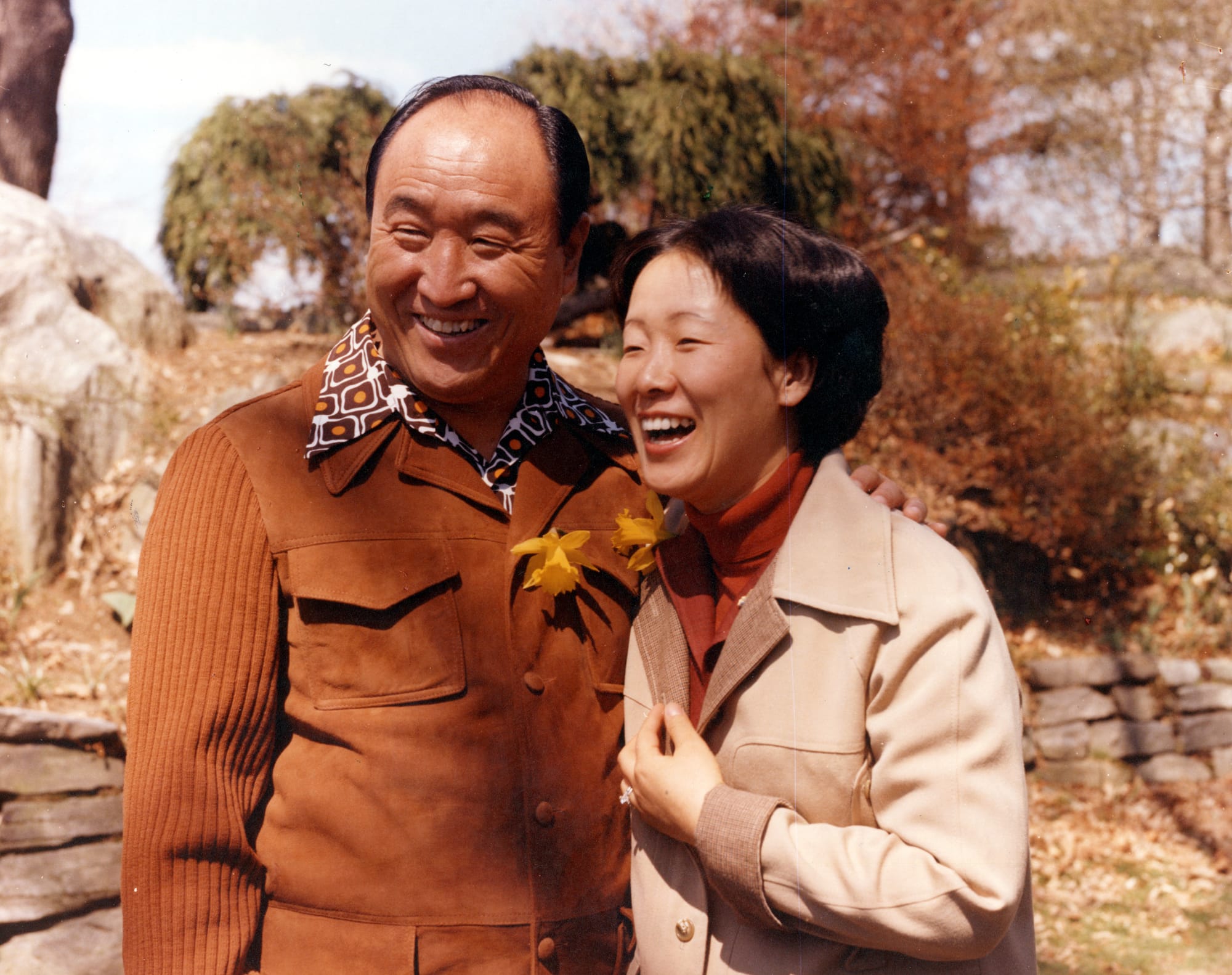Jacob is one of the most victorious figures in the Bible, and one of the most problematical. Clever and ambitious, he tricked his brother into selling him his birthright and deceived his father Isaac into giving him his brother’s blessing.
Yet, as he went through hardships in Haran and was himself deceived and mistreated by his uncle Laban, we sense a growing maturity that comes to fruition when he can win over his hostile brother with gifts and genuine humility.
Through all the vicissitudes in his life, we can see his genuine faith in God and his desire to guard and perpetuate the godly tradition of his forefathers, Abraham and Isaac.
Father Moon has the highest regard for Jacob, whom he regards as the most successful providential figure in the Old Testament. In reconciling with his brother Esau, Jacob is the first person in biblical history to win over his enemy with love and sacrifice.
Father Moon’s view of God’s providence as a course of restoration, to turn right-side up all the things turned upside-down by the human fall, Jacob restored much: By defeating the angel he restored for the first time Adam’s defeat by the angel Lucifer, and by winning over his brother Esau he restored for the first time the failure of Cain and Abel.
Jacob is a role model to Father Moon and to anyone who understands that God entrusts to us a certain portion of responsibility, to exert ourselves to overcome adversity and restore the mistakes of the past. Therefore, his appellation “Israel,” meaning “he who strives with God,” is well deserved.

Jacob’s Rivalry with Esau
Isaac prayed to the Lord for his wife, because she was barren; and the Lord granted his prayer, and Rebecca his wife conceived. The children struggled together within her; and she said, “If it is thus, why do I live?” So she went to inquire of the Lord.
And the Lord said to her, “Two nations are in your womb, and two peoples, born of you, shall be divided; the one shall be stronger than the other, the elder shall serve the younger.” When her days to be delivered were fulfilled, behold, there were twins in her womb. The first came forth red, all his body like a hairy mantle; so they called his name Esau. Afterward his brother came forth, and his hand had taken hold of Esau’s heel; so his name was called Jacob.
Genesis 25.21-26
When the boys grew up, Esau was a skilful hunter, a man of the field, while Jacob was a quiet man, dwelling in tents. Isaac loved Esau because he ate of his game, but Rebecca loved Jacob.
Once when Jacob was boiling pottage, Esau came in from the field, and he was famished. And Esau said to Jacob, “Let me eat some of that red pottage, for I am famished!” (Therefore his name was called Edom.) Jacob said, “First sell me your birthright.” Esau said, “I am about to die; of what use is a birthright to me?” Jacob said, “Swear to me first.” So he swore to him, and sold his birthright to Jacob. Then Jacob gave Esau bread and pottage of lentils, and he ate and drank, and rose and went his way. Thus Esau despised his birthright. Genesis 25.27-34
When Isaac was old and his eyes were dim so that he could not see, he called Esau his older son, and said to him, “My son”; and he answered, “Here I am.” He said, “Behold, I am old; I do not know the day of my death. Now then, take your weapons, your quiver and your bow, and go out to the field, and hunt game for me, and prepare for me savory food, such as I love, and bring it to me that I may eat; that I may bless you before I die.” Now Rebecca was listening when Isaac spoke to his son Esau… She prepared savory food, such as his father loved. Then she took the best garments of Esau her older son, which were with her in the house, and put them on Jacob her younger son; and the skins of the kids she put upon his hands and upon the smooth part of his neck; and she gave the savory food and the bread, which she had prepared, into the hand of her son Jacob. So he went in to his father, and said, “My father”; and he said, “Here I am; who are you, my son?” Jacob said to his father, “I am Esau your firstborn. I have done as you told me; now sit up and eat of my game, that you may bless me.” But Isaac said to his son, “How is it that you have found it so quickly, my son?” He answered, “Because the Lord your God granted me success.” Then Isaac said to Jacob, “Come near, that I may feel you, my son, to know whether you are really my son Esau or not.” So Jacob went near to Isaac his father, who felt him and said, “The voice is Jacob’s voice, but the hands are the hands of Esau.” And he did not recognize him, because his hands were hairy like his brother Esau’s hands; so he blessed him. He said, “Are you really my son Esau?” He answered, “I am.” Then he said, “Bring it to me, that I may eat of my son’s game and bless you.” So he brought it to him, and he ate; and he brought him wine, and he drank. Then his father Isaac said to him, “Come near and kiss me, my son.” So he came near and kissed him; and he smelled the smell of his garments, and blessed him, and said, “See, the smell of my son is as the smell of a field which the Lord has blessed! May God give you of the dew of heaven, and of the fatness of the earth, and plenty of grain and wine. Let peoples serve you, and nations bow down to you. Be lord over your brothers, and may your mother’s sons bow down to you. Cursed be every one who curses you, and blessed be every one who blesses you!”… Now Esau hated Jacob because of the blessing with which his father had blessed him, and Esau said to himself, “The days of mourning for my father are approaching; then I will kill my brother Jacob.” But the words of Esau her older son were told to Rebecca; so she sent and called Jacob her younger son, and said to him, “Behold, your brother Esau comforts himself by planning to kill you. Now therefore, my son, obey my voice; arise, flee to Laban my brother in Haran, and stay with him a while, until your brother’s fury turns away.” Genesis 27.1-29, 41-44

Teachings of Sun Myung Moon
What happened as a result of the fall is that Satan’s son [Cain] was born as the elder son. Therefore, God had to replace the elder son with the younger one.
Otherwise, there would be no way for God’s Will to be bequeathed to future generations. Hence, God had to set up a dispensation of conflict between brothers, which happened in the lives of Jacob and Esau. (102:177, December 24, 1978)
In God’s world, it is the elder son, not the younger, who is to receive the blessing and inheritance. Thus, unless Jacob, as the second son, first gains the birthright and takes the position of the elder son, he is not qualified according to the standard of the Principle to receive God’s blessing.
What was Jacob’s wisdom? Knowing that his elder brother Esau was hungry, he bought the birthright from him in exchange for some pottage of lentils.
By this purchase, he was entitled to receive the inheritance of the elder son from his father, even if his father opposed or he had to deceive him to acquire it. It was inevitable that God set up this situation, to restore through indemnity what was lost at the fall. (131:180-81, May 1, 1984)
Jacob thought, “If I am several times more persistent than my elder brother, and if I am better than my siblings in serving God, my father and my mother, then I can win the position of the elder son.”
It was logical for Jacob to believe that if he were better than Esau in attending God, his parents, siblings and kinsfolk, they would want to place him in the position of elder son and support him. Jacob was wise.
He envisioned this goal from the beginning and fought with this objective in mind, all the way to the end. Esau, on the other hand, was only looking at his immediate situation. (108:96, June 29, 1980)
Jacob deceived his father by wearing a goatskin to imitate his brother Esau, who was a very hairy man. Jacob approached his father, who was practically blind, and let him touch the hide on his arms to convince him that he was Esau.
Then his father blessed Jacob with the blessing intended for his brother.20 Why did God’s dispensation require this? According to the Principle of Creation, only the eldest son can receive the inheritance.
Therefore, in order to receive God’s inheritance, Jacob had to take the birthright from his elder brother. However, he could not just take it without a condition.
Since Esau had already sold the birthright to Jacob, Jacob was simply taking possession of what was already his. That is why Jacob was not wrong; rather, Esau was wrong for having sold his birthright.
Jacob truly cherished the birthright; he was anxious to inherit it and bring together all the generations of his family. That is why the Bible speaks of “the God of Abraham, Isaac and Jacob.” Jacob knew the will of God and God’s dispensation, and he wanted to become the heir who could receive the inheritance…
What does this mean for us? The fallen world is in the position of the elder son. But through this course, Jacob restored the birthright of the elder son on the side of Heaven.
Similarly, among nations, from a worldly standpoint, the leading powers have the right of the elder son, but from the standpoint of God’s Will Israel is the elder son.
These two elder sons would confront each other on the national level as Israel confronted the Roman Empire. Even to this day, the mission of the chosen people is to restore the birthright from Esau, beginning on the individual and family level all the way to the world level. (102:177, December 24, 1978)
When their father gave his blessing to Jacob, the birthright was restored. However, because of this Esau was extremely angry and wanted to kill Jacob, just as Cain had killed Abel. (55:112, April 1, 1972)
Jacob’s Labors under His Uncle Laban
Then Laban said to Jacob, “Because you are my kinsman, should you therefore serve me for nothing? Tell me, what shall your wages be?” Now Laban had two daughters; the name of the older was Leah, and the name of the younger was Rachel. Leah’s eyes were weak, but Rachel was beautiful. Jacob loved Rachel, and he said, “I will serve you seven years for your younger daughter Rachel.” Laban said, “It is better that I give her to you than that I should give her to any other man; stay with me.” So Jacob served seven years for Rachel, and they seemed to him but a few days because of the love he had for her. Then Jacob said to Laban, “Give me my wife that I may go in to her, for my time is completed.” So Laban gathered together all the men of the place, and made a feast. But in the evening he took his daughter Leah and brought her to Jacob, and he went in to her… And in the morning, behold, it was Leah, and Jacob said to Laban, “What is this you have done to me? Did I not serve with you for Rachel? Why then have you deceived me?” Laban said, “It is not so done in our country, to give the younger before the firstborn. Complete the week of this one, and we will give you the other also in return for serving me another seven years.” Jacob did so, and completed her week; then Laban gave him his daughter Rachel to wife… So Jacob went in to Rachel also, and he loved Rachel more than Leah, and served Laban for another seven years… Then the Lord said to Jacob, “Return to the land of your fathers and to your kindred, and I will be with you.” So Jacob sent and called Rachel and Leah into the field where his flock was, and said to them, “I see that your father does not regard me with favor as he did before. But the God of my father has been with me. You know that I have served your father with all my strength; yet your father has cheated me and changed my wages ten times, but God did not permit him to harm me. If he said, ‘The spotted shall be your wages,’ then all the flock bore spotted; and if he said, ‘The striped shall be your wages,’ then all the flock bore striped. Thus, God has taken away the cattle of your father, and given them to me. In the mating season of the flock I lifted up my eyes, and saw in a dream that the he-goats which leaped upon the flock were striped, spotted, and mottled. Then the angel of God said to me in the dream, ‘Jacob,’ and I said, ‘Here I am!’ And he said, ‘Lift up your eyes and see, all the goats that leap upon the flock are striped, spotted, and mottled; for I have seen all that Laban is doing to you. I am the God of Bethel, where you anointed a pillar and made a vow to me. Now arise, go forth from this land, and return to the land of your birth.’” Then Rachel and Leah answered him, “Is there any portion or inheritance left to us in our father’s house? Does he not regard us as foreigners? For he has sold us, and he has been using up the money given for us. All the property which God has taken away from our father belongs to us and to our children; now then, whatever God has said to you, do.” Genesis 29.15-30; 31.3-16
Teachings of Sun Myung Moon
Jacob went to the land of Haran and worked as a servant for his maternal uncle Laban for twenty-one years. His uncle had promised to give him his daughter Rachel as his wife.
But after seven years, Laban deceived Jacob and gave him her sister Leah instead. If it had been you, you would have immediately protested. But Jacob kept silent, worked for another seven years, and got Rachel.
Even after that, his uncle Laban deceived him again and again, trying to cheat him of the possessions that God had given him. Still, Jacob did not complain.
Here we must know that even though Jacob was in the loneliest of situations, still he thought of nothing else but God’s Will. Because of that, other things in his life did not matter; the important thing was to accomplish God’s Will. He grew farther from the world but came to receive more love from God. (52:64-65, December 22, 1971)
After being chased out and spurned by his relatives, how did Jacob overcome his difficulties? He never forgot the blessing he received from God, and he kept unwavering faith in God. He vowed he would not change, no matter how his circumstances changed.
Jacob had such faith that, even if Heaven did not believe in him, he was determined to make his family believe in him. He was determined to complete the unfinished task of the blessing given to him, and thus laid the foundation upon which God could advance His providence.
With a burning desire to inherit the will of Heaven’s principle that God had tried to establish through Abraham’s family, Jacob could form a family of faith and return after twenty-one years. (4:139-40, March 30, 1958)
You are in the position of Jacob. You knew that God’s blessing was yours, and with faith in this movement you left your homes. Those of you who faced opposition and persecution from your parents and siblings, raise your hands. After leaving his home, could Jacob go directly to God?
No, he had to go to Haran. You, too, must go to your own “Haran,” the world where you must experience drudgery and there restore people and possessions. (67:123, May 27, 1973)
Jacob Wrestles with an Angel
And Jacob was left alone, and a man wrestled with him until the breaking of the day. When the man saw that he did not prevail against Jacob, he touched the hollow of his thigh, and Jacob’s thigh was put out of joint as he wrestled with him.
Then he said, “Let me go, for the day is breaking.” But Jacob said, “I will not let you go, unless you bless me.” And he said to him, “What is your name?” “Jacob.” “Your name shall no more be called Jacob, but Israel, for you have striven with God and with men, and have prevailed.” Then Jacob asked him, “Tell me, I pray, your name.” But he said, “Why is it that you ask my name?” And there he blessed him. So Jacob called the name of the place Peniel, saying, “For I have seen God face to face, and yet my life is preserved.” The sun rose upon him as he passed Penuel, limping because of his thigh.22 Genesis 32.24-31
Teachings of Sun Myung Moon
When the angel appeared, Jacob knew he was a messenger from God. He asked the angel, “Do you come to hinder me or to bless me?” The angel answered, “I have come to bless you.”
Jacob then asked, “If you came to bless me, then why don’t you simply give me the blessing?” The angel answered, “I cannot give it to you freely because your portion of responsibility still remains.” In other words, the angel would not bless Jacob unless he fought with desperate effort.
When the angel presented that condition, Jacob wrestled with determination, “Alright, it is fine with me. Even if you break my arm I will not let you defeat me. Even if you strike me with a sword or cut my head off, I will not let go of you.” How long do you think Jacob wrestled? It was all through the night.
Both God and Satan were watching that scene. Jacob was desperate, knowing that this was the final showdown. Hence, even when the angel struck him in his hip and his thigh, he did not release the angel from his grasp. He thought, “If I die, I die. Even if we both die, I will not let go of you.”
It was nerve-wracking for God to watch Jacob in that battle. Since the angel was fighting on behalf of Satan, God did not want Jacob to give up, but He could not say anything to Jacob. Imagine how anxious God must have been to watch each moment ticking during the battle between the two?
Jacob did not give up even to the last moment. He would not let go of the angel no matter how desperately the angel tried to shake him off. At that point, God publicly acknowledged Jacob’s victory, and the angel, as Satan’s representative, had to acknowledge it as well.
Hence, he blessed Jacob with the name “Israel.” At that moment, all the hosts of heaven shouted for joy. They deeply exhaled, now that anxiety over the outcome was relieved.
Jacob’s love for God, which enabled him to hold on to God’s neck, shedding tears for Him for twenty years, far surpassed God’s relationship with Adam and Eve before the Fall. Therefore, he could receive the name “Israel.” (20:229-30, June 9, 1968)
If Jacob had not been so well-trained in Haran under the servitude of Laban, he would not have been able to defeat the angel at the ford of Jabbok.
Jacob knew that those 21 years of bitter struggle were all for this moment. He knew that what happened this night would determine victory or defeat. That is what enabled him to persevere until the end and win.
The strength cultivated during his 21-year course also enabled him to subjugate Esau. Then, he could be reunited with his parents. (67:126, May 27, 1973)
The Human Fall occurred when an angel, Lucifer, subjugated human beings; therefore, for restoration, humans must subjugate an angel. For this reason, God sent the angel and let him attack Jacob.
Once Jacob defeated the angel, it would open the door to defeating Esau, the substantial being of the archangel who was under the control of the spiritual Satan… What was the meaning of Jacob’s victory over the angel?
It was a spiritual victory over the entire angelic world. From that time on, Jacob was assisted not only by God but also by the angelic world wherever he went.
Most importantly, Satan could no longer spiritually control Esau, so when Esau confronted Jacob the next day, he was bound to submit to his younger brother. (92:285, April 18, 1977)
Why did the angel strike the hollow of Jacob’s thigh? The human fall was caused by the misuse of the lower parts; therefore, the blow to the sinful part of the body was an act of restitution by the principle of “an eye for an eye, a tooth for a tooth.” Once that restitution was complete, the angel was free to bless Jacob. (55:113, April 1, 1972)
Jacob’s Reconciliation with Esau
Jacob sent messengers before him to Esau his brother in the land of Seir, the country of Edom, instructing them, “Thus you shall say to my lord Esau, ‘Thus says your servant Jacob, “I have sojourned with Laban, and stayed until now; and I have oxen, asses, flocks, menservants, and maidservants; and I have sent to tell my lord, in order that I may find favor in your sight.”’” And the messengers returned to Jacob, saying, “We came to your brother Esau, and he is coming to meet you, and four hundred men with him.” Then Jacob was greatly afraid and distressed; and he divided the people that were with him, and the flocks and herds and camels, into two companies, thinking, “If Esau comes to the one company and destroys it, then the company which is left will escape.” And Jacob said, “O God of my father Abraham and God of my father Isaac, O Lord who said to me, ‘Return to your own country and to your kindred, and I will do you good,’ I am not worthy of the least of all the steadfast love and all the faithfulness which you have shown to your servant, for with only my staff I crossed this Jordan; and now I have become two companies. Deliver me, I pray, from the hand of my brother, from the hand of Esau, for I fear him, lest he come and slay us all, the mothers with the children. But you said, ‘I will do you good, and make your descendants as the sand of the sea, which cannot be numbered for multitude.’” So he lodged there that night, and took from what he had with him a present for his brother Esau, two hundred she-goats and twenty he-goats, two hundred ewes and twenty rams, thirty milch camels and their colts, forty cows and ten bulls, twenty she-asses and ten he- asses. These he delivered into the hand of his servants, every drove by itself, and said to his servants, “Pass on before me, and put a space between drove and drove.” He instructed the foremost, “When Esau my brother meets you, and asks you, ‘To whom do you belong? Where are you going? And whose are these before you?’ then you shall say, ‘They belong to your servant Jacob; they are a present sent to my lord Esau; and moreover he is behind us.’” He likewise instructed the second and the third and all who followed the droves, “You shall say the same thing to Esau when you meet him, and you shall say, ‘Moreover your servant Jacob is behind us.’” For he thought, “I may appease him with the present that goes before me, and afterwards I shall see his face; perhaps he will accept me.” So the present passed on before him; and he himself lodged that night in the camp… And Jacob lifted up his eyes and looked, and behold, Esau was coming, and four hundred men with him. So he divided his children among Leah and Rachel and the two maids. He put the maids with their children in front, then Leah with her children, and Rachel and Joseph last of all. He himself went on before them, bowing himself to the ground seven times, until he came near to his brother. But Esau ran to meet him, and embraced him, and fell on his neck and kissed him, and they wept. And when Esau raised his eyes and saw the women and children, he said, “Who are these with you?” Jacob said, “The children whom God has graciously given your servant.” Then the maids drew near, they and their children, and bowed down; Leah likewise and her children drew near and bowed down; and last Joseph and Rachel drew near, and they bowed down. Esau said, “What do you mean by all this company which I met?” Jacob answered, “To find favor in the sight of my lord.” But Esau said, “I have enough, my brother, keep what you have for yourself.” Jacob said, “No, I pray you, if I have found favor in your sight, then accept my present from my hand; for truly to see your face is like seeing the face of God, with such favor have you received me.” Genesis 32.3-33.10
Teachings of Sun Myung Moon
The struggle over the birthright continued even after Jacob received the blessing from his father. When he returned after twenty-one years of hardships in the land of Haran he encountered Esau, who still nursed the desire to kill him.
However, in the end Esau welcomed him and embraced him. Through this victory, the people of Israel could be established, graced with the birthright as the elder son nation of God. (102:177, December 24, 1978)
Jacob knew his brother Esau was ready to kill him. So he resolved to offer his wealth and servants to his elder brother. He wanted to give them all to Esau, all the things that he had earned during his entire life.
Jacob prayed to God not to punish Esau, but asked God to bless Esau as He had blessed him. Because of that heart, Esau was moved to relinquish his desire to kill Jacob; and he too received God’s blessing. (52:64-65, December 22, 1971)
When Jacob returned home and wanted to claim the position of the elder son that he had been blessed with years before, who should publicly acknowledge him?
Who should sign the certificate? It is Esau, in the position of Cain, who should signify his approval. Without Esau’s approval, Jacob could not receive the blessing from God.
During his twenty-one years in a foreign land, Jacob had prospered and gathered his own clan. He knew he had to make a superior foundation in every aspect in order to overcome Esau… That is why Jacob worked hard to gain cattle, servants and property; he needed to have more wealth than his brother.
Then he could send gifts of servants and possessions to his brother, and to his elderly parents as well. Through these gifts, Jacob wanted to make his elder brother think: “My brother is a fearful man. Indeed, God blessed him. It was my mistake that I sold my birthright so cheaply; hence, I deserve to be less successful than my younger brother.
So, when my brother comes, I should not reject him. I should rather welcome him.” In this way, Jacob could move Esau to recognize that God was with him and to acknowledge that he was in the position of Abel.23 This is the path we should walk; this is the tradition we should follow. It is a formula applicable in any situation and in every age. (106:183-84, December 30, 1979)
The Bible records that God hated Esau from the womb (Romans 9:11-13), but this was only because he had been given the role of Cain, who was on Satan’s side, for the purpose of setting up an indemnity condition in the providence of restoration.
When he fulfilled his portion of responsibility by submitting to Jacob, he restored Cain’s position and thus at last was able to receive God’s love. (Exposition of the Divine Principle, Foundation 3.2)
Only after the reunion with his brother Esau could Jacob meet his parents, whom he had missed for so many years and enjoy the peace he had longed for.
We, too, can enter God’s kingdom and meet God and True Parents only after we have gone through the course of Jacob and made oneness with the Esau in our life, for such is the restoration of Cain and Abel. (67:135, May 27, 1973)





